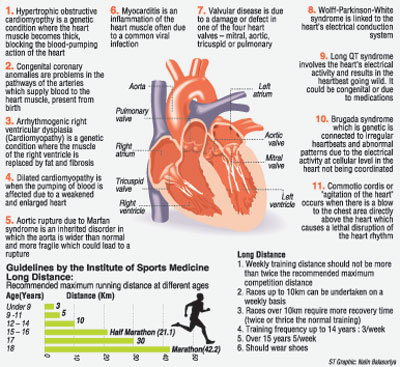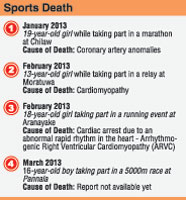News
Energy drinks with caffeine may be fatal, cardiologist warns athletes
View(s):By Kumudini Hettiaarachchi
Avoid caffeine-packed energy drinks during strenuous sports activity, cautioned a heart doctor, strongly urging coaches, trainers and parents to refrain from encouraging young athletes to take these drinks. Too much of caffeine can stimulate the heart to go into abnormal rhythms, said Consultant Cardiologist Dr. Gamini Galappatthy, stressing that this could even be fatal.
When asked about speculation in sports circles that some coaches were getting their athletes to take asthma medication during half-time or breaks, Dr. Galappatthy who is an advisor to the Institute of Sports Medicine said it was illegal to do so.

“The heart of an athlete is in a sensitive state due to the strenuous sports activity and the beta stimulant in asthma medications would speed up the heart rate. It will also change the potassium balance inside and outside the body’s cells causing a fast heart rhythm which may lead to fatal consequences,” he said.
These warnings came as authorities made a basic heart-check mandatory for all schoolchildren taking part in running events of 3,000 metres or more, galvanised into action, after the recent deaths of four teenagers during sports events. An ECG (electrocardiogram) is now compulsory for all students taking part in such events, following a joint decision by the Ministries of Education, Health and Sports. An ECG records the electrical activity of the heart.
With a circular going out to all schools, Institute of Sports Medicine Director-General Prof. Arjuna de Silva stressed the importance of the pre-participation evaluation of students before a sports event. The authorities are also looking into the possibility of making an ECG compulsory during the school medical examination of students of Grade 7, the Sunday Times learns.
While pointing out that there are sports-related guidelines (see graphic), Prof. de Silva urged that when assessing whether a child should participate in physical activity, other considerations that should be taken into account are whether the child has had a recent illness including a temperature, aches, pains and general muscular tiredness.
“A first-aider should be present at all sporting events where the participants are under 16 years of age, while a sports trainer should be present when the participants are over 16. Any complaint of pain, tenderness, limitation of movements or disability should be referred immediately to a qualified sports first-aider, trainer or medical professional for management,” says Prof. de Silva.With cardiology and sports being strongly linked, Dr. Galappatthy pinpointed the risk factors for sudden cardiac death in young athletes.
The causes, according to him, could vary from the common to the rare — hypertrophic cardiomyopathy, congenital coronary anomalies, arrhythmogenic right ventricular dysplasia, dilated cardiomyopathy, aortic rupture due to Marfan syndrome, myocarditis, valvular disease and electrical disorders such as Wolff-Parkinson-White syndrome, long QT syndrome and Brugada syndrome to commotio cordis. (See graphic)

Pointing out that Sports Medical Officers have been appointed to the districts, he said that they have been given all facilities to carry out their duties. Usually, in the general population, about 10% (1 in 10 persons) would have an abnormal ECG and when detected would be referred to a Specialist for evaluation. The current circular is with regard to running events of 3,000-metre or more at school-level, but in time to come is likely to be implemented for other sports which need prolonged stamina.
When training, athletes should not overstep their endurance levels as over-exertion could lead to the rupture of a coronary artery resulting in a heart attack and death. Those who have had a bout of viral fever should not get back into strenuous sports too soon, he said, citing the example of dengue which can cause myocarditis if the virus invades the heart as it could be lethal.
Follow @timesonlinelk
comments powered by Disqus















